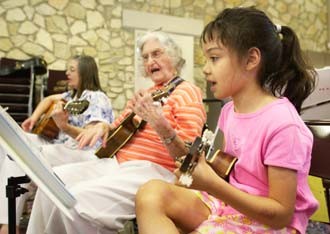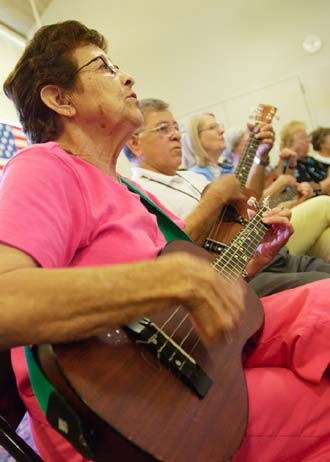| From right: Rebecca Monreal, 7, her great-grandmother Lydia Barrett, 83, and grandmother Joan Boomer. Photo by Mark Greenberg |
At the end of this year's San Antonio Ukulele Festival, a young Hawaiian guy stepped up to take part in the open-mic jam.
Most of the participants in the April event had been senior citizens, regulars at the Lion's Field Adult Center, where the festival was held. They played traditional Hawaiian songs about boats and paddles and luaus. But this performer was up to something different.
"He got up there with a beautiful Hawaiian-made ukulele with a pickup in it," recalls Mark Waldrop, owner of Guitar Tex, a local music store specializing in acoustic instruments. "He plugged it in, the music started, and he did this tour-de-force version of 'Johnny B. Goode.' He's duckwalking, he's doing the splits, he's playing it behind his head. He brought the house down."
Such a raucous use of a famously gentle instrument not only electrified the 120 people who packed the Lion's Field, it provided a reminder that the uke has played its own modest role in the history of rock.
George Harrison avidly collected ukes, and was known to hand them out to musical friends Tom Petty or Jeff Lynne whenever they dropped by to see him. While most fans associate Harrison with his distinctive use of the slide guitar or sitar, those who knew him best think of Harrison strumming away on one of his prized Hawaiian ukes.
On his 2002 Driving U.S.A. tour, Paul McCartney paid tribute to his ex-bandmate by performing Harrison's classic ballad "Something" on ukulele. More than 30 years earlier, McCartney had built his song "Ram On" around a spare uke arrangement, something Pete Townshend also did in 1975 for the song "Blue, Red, & Grey."
Because, as Waldrop points out, baby boomers associate the ukulele with Tiny Tim or Arthur Godfrey, most people tend to view it as a novelty instrument or a four-stringed toy that you pick up as a souvenir of your Hawaiian vacation.
| LION'S FIELD JAM 7pm Thursday, July 31 Free Lion's Field Adult Center Mulberry & Broadway 826-9041 |
San Antonio's most dedicated proponent of the ukulele is Joyce Flaugher, who learned to hula dance during her husband's Navy tour of duty in Hawaii. When she and her husband returned to the mainland in the late-'70s, she began dancing for a Houston ukulele club.
"During the times when they didn't need me to dance, I just picked up the ukulele and learned to play it," Flaugher says. "It was just so much fun and so easy to do and everybody always had a good time. It's a very social instrument."
In January 2000, Flaugher began teaching uke classes at Lion's Field, drawing three people to her first lesson, and watching interest grow exponentially from week to week. She teaches classes, performs with the Lion's Field Ladies and Gents, and with her sisters in Pearl's Girls, spearheads Lion's Field's monthly uke jam sessions, and sponsors the city's annual Ukulele Festival.
Flaugher is pushing to make next year's festival an official part of Fiesta, and talks with a missionary zeal about making San Antonio the ukulele capital of Texas. "My goal is to teach everybody to play," she says. "I've seen so many people go from not giving themselves permission to do it, to becoming really good players."
One of Flaugher's most devout uke disciples is 83-year-old Lydia Barrett. Three years ago, as she approached her 80th birthday, Barrett says she felt depressed and unmotivated. She heard about Flaugher starting a ukulele class at Lion's Field and decided to give it a try.
"When I was in high school, it was very popular to play the ukulele, but during the Depression, nobody had any money," Barrett says. "So I said, 'Someday I'm going to play it.' I just had to wait until I was 80."
| Aurora Saenz of New Braunfels participates in the Ukulele Ladies & Gents advanced class recently at Lion's Field Adult Center. Photo by Mark Greenberg |
These days, it is common to see four generations of Barrett women strumming side by side, with 7-year-old Rebecca already showing signs of being a uke prodigy. "Rebecca said she wanted to play and she picked it up real fast," Barrett says. "Now she plays better than I do."
On Thursday afternoons, Flaugher steers the Ladies and Gents through song selections like "Princess Pupule," "One Paddle, Two Paddle," and "Little Grass Shack." She is relentlessly casual and good-natured, occasionally reminding the group, "We're not perfectionists here." For her, the results are secondary. The very process of making music is therapeutic, and the uke is the most populist of all therapeutic devices.
"Hawaii uses the ukulele as the musical instrument to teach music in the schools, the way we might use the recorder. And Canada does the same," Flaughers says. "There are a lot of players who come to the ukulele from guitar and from mandolin. I have taken guitar lessons and sat in on groups and I find it difficult. So I keep going back to the ukulele." •



